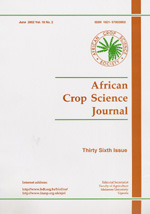
|
African Crop Science Journal
African Crop Science Society
ISSN: 1021-9730
EISSN: 1021-9730
Vol. 20, No. s2, 2012, pp. 487-491
|
 Bioline Code: cs12061
Bioline Code: cs12061
Full paper language: English
Document type: Research Article
Document available free of charge
|
|
|
African Crop Science Journal, Vol. 20, No. s2, 2012, pp. 487-491
| fr |
NWACHUKWU, I.N.; EZEH, C.I. & EMEROLE, C.O.
Résumé
Le consensus mondial fondé sur une évidence empirique que l’univers est confronté à une menace du changement climatique a nourri le sentiment et la croyance que tant de pays des régions tropicales et subtropicales sont plus
vulnérables au phénomène bizarre. La situation sera plus sévère en Afrique où l’information sur le changement
climatique est la plus pauvre et le changement technologique a été le plus lent, et les économies domestiques
dépendent largement de l’agriculture. Cette étude a examiné l’effet relatif du changement climatique sur la
productivité du cacao au Nigeria. Les données employées étaient des agrégats nationaux d’exportations des
cultures et des variables climatiques collectées de sources secondaires fiables couvrant la période 1961 – 2010.
Dans l’ensemble, les précipitations ont enregistré un coefficient négatif significatif alors que la température a
enregistré un coefficient positif, impliquant une réduction des précipitations avec une élévation de la température.
En plus, seules la précipitation et ses variables climatiques ont influencé la productivité du cacao. Il est par
conséquent recommandé que les producteurs du cacao adoptent de nouvelles mesures pour faire face aux effets
négatifs du changement climatique.
Mots Clés
Variables climatiques, cultures exportées, fermiers, séries de temps
|
| |
| en |
EFFECT OF CLIMATE CHANGE ON COCOA PRODUCTIVITY IN NIGERIA
NWACHUKWU, I.N.; EZEH, C.I. & EMEROLE, C.O.
Abstract
The increasing global consensus built on empirical evidence that the world is facing a threat from climate change
has sustained the feeling and belief that many countries in tropical and sub-tropical regions be more vulnerable to
the bizarre phenomenon. The situation will be most severe in Africa where information on climate change is the
poorest, technological change has been the slowest, and the domestic economies depend the most heavily on
agriculture. The study examined the relative effect of climate change on the productivity of cocoa in Nigeria. Data
employed were national aggregates of the export crop and climate variables collected from reputable secondary
sources covering 1961 – 2010. Overall, rainfall recorded a significant negative coefficient while that of temperature
was positive coefficient, implying decreasing rainfall with rising temperature. More so, rainfall and its squared
term were the only significant climatic variables influencing the productivity of cocoa. It is therefore suggested
that cocoa farmers should adopt new measures to cope with the emerging negative effect of climate change.
Keywords
Climate variables, export crop, farmers, time series
|
| |
© Copyright 2012 - African Crop Science Society
|
|
